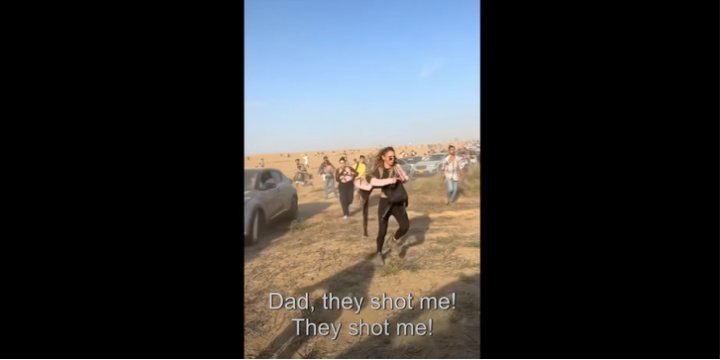Partygoers at the Supernova Psy-Trance Festival running to safety during the Hamas attack on Oct. 7, 2023, as seen in the documentary “Supernova: The Music Festival Massacre.” Photo: Screenshot
One of the most important events in recent Middle East history took place 25 years ago this summer. In July 2000, President Bill Clinton brought Israeli Prime Minister Ehud Barak and Palestinian Authority President Yasser Arafat to Camp David to negotiate an end to the Israeli-Palestinian conflict. Despite generous concessions offered by Barak, Arafat refused to accept them and the talks ended in failure.
Given that the Palestinians still don’t have a state, one would think that Arafat’s refusal to negotiate peace would be a constant element of reporting on the Middle East. But it isn’t.
I searched The Washington Post for clues.
The Post has a new artificial intelligence (AI) feature that answers questions by aggregating information from the paper’s extensive archives.
So I entered “Arafat Barak Camp David” into the AI search bar and learned, “The summit’s failure was attributed to the inability of the parties to agree on key issues, and it highlighted the challenges of negotiating a peaceful resolution to the conflict.”
In contrast, when I entered the same terms into Google’s AI, there was a lot more information including, “US President Clinton blamed Arafat for the failure, and this narrative gained traction in the US and Israel.”
AI is a tool. It applies an algorithm to inputs. If the inputs are faulty, then the results will be too. If the Post’s reporting omitted or downplayed Arafat’s responsibility for the failure of peace, then the AI tool also will.
In fact, a 2023 Post retrospective of the failed summit observed, “… the disputes between Israelis and Palestinians proved impervious to Clinton’s brand of charm, cajolery and crisis management.”
There was nothing about Israeli concessions and nothing about Arafat’s refusal to accept a deal. Why would a reporter deviate from the approach established a quarter century ago?
I asked the Post’s AI about “Israel occupation West Bank,” and its answer began, “The Israeli occupation of the West Bank has led to significant tensions and violence in the region.”
When Israel is involved, the Post assigns blame.
The answer concluded with, “The international community has called for an end to the occupation and the establishment of a Palestinian state, with many countries recognizing Palestine as a sovereign state. However, the Israeli government has resisted these efforts, with some arguing that a Palestinian state would pose a threat to Israel’s security.”
Prompted by the AI tool, I asked, “how much has terror increased since Israel made peace with the PLO in 1993?”
The AI tool responded, “Terror has increased significantly since the Israel-PLO peace agreement in 1993.”
That observation says that empirically a Palestinian state could very likely be a threat to Israel. But the AI tool doesn’t have the capability to incorporate it into its responses.
I only asked about increased terror, so this sentence is interesting, “The conflict has escalated, with Israel launching airstrikes and ground operations in Gaza, and Palestinian militant groups firing rockets into Israel.” It’s odd that the AI tool didn’t mention one of the deadliest terror attacks in history on October 7, 2023, and instead turned its attention to the overall conflict.
Finally, I asked the Post’s AI tool about “sexual violence October 7.” The response began, “On October 7, there were reports of sexual violence, including forced nudity and the posting of ‘sexualized images’ on social media.”
Seriously, “there were reports?”
Reading further down in the reply, the AI tool observed, “Witnesses and first responders described graphic scenes of violence, including gang rape and the torture of women.”
That should have been the first sentence, with the full response building on that. Instead, most of the article is casting doubts on the extent of the sexual violence, including, incredibly, a denial by Hamas.
The reply also noted that, “the full extent of sexual violence that day will likely never be fully known due to stigma, trauma, and the fact that many victims were probably killed.” Sexual assault victims cannot describe what happened to them, but their bodies unfortunately would show signs of the trauma they sustained.
It’s shocking that a major American newspaper played down the extent of one of the more brutal aspects of the October 7 terror attack, when there’s plenty of corroborating evidence supporting the charges.
The Post’s AI tool is important, not as a historical tool, but the way it exposes the Post’s myopia with respect to the Israeli-Palestinian conflict. If an event can be blamed on Israel, the Post is not shy about ascribing blame. If the Palestinians are to blame, the Post will do all it can to minimize or erase it.
David Gerstman is a freelance journalist living in Baltimore. He was previously senior editor of The Tower magazine.
Click this link for the original source of this article.
Author: David Gerstman
This content is courtesy of, and owned and copyrighted by, https://www.algemeiner.com and its author. This content is made available by use of the public RSS feed offered by the host site and is used for educational purposes only. If you are the author or represent the host site and would like this content removed now and in the future, please contact USSANews.com using the email address in the Contact page found in the website menu.








